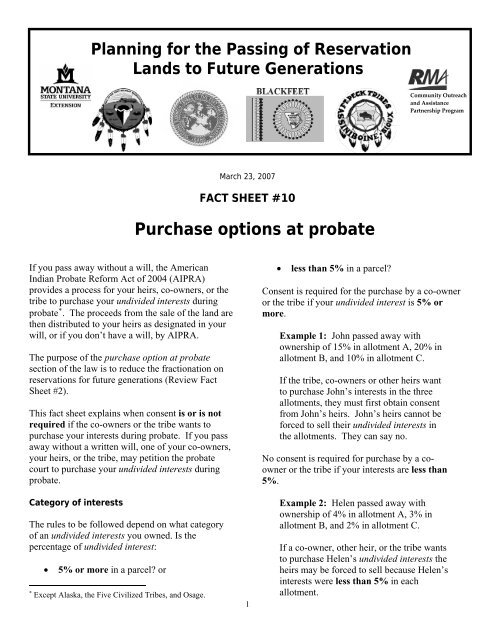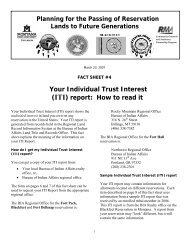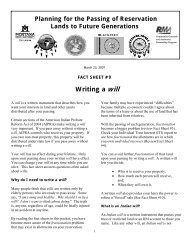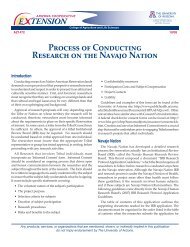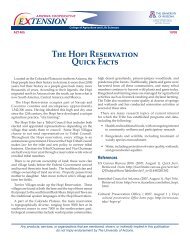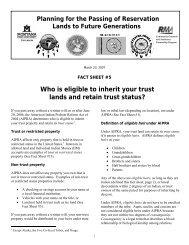AIPRA Factsheet 10 - Indian Country Extension
AIPRA Factsheet 10 - Indian Country Extension
AIPRA Factsheet 10 - Indian Country Extension
- No tags were found...
You also want an ePaper? Increase the reach of your titles
YUMPU automatically turns print PDFs into web optimized ePapers that Google loves.
Planning for the Passing of Reservation<br />
Lands to Future Generations<br />
Community Outreach<br />
and Assistance<br />
Partnership Program<br />
March 23, 2007<br />
FACT SHEET #<strong>10</strong><br />
Purchase options at probate<br />
If you pass away without a will, the American<br />
<strong>Indian</strong> Probate Reform Act of 2004 (<strong>AIPRA</strong>)<br />
provides a process for your heirs, co-owners, or the<br />
tribe to purchase your undivided interests during<br />
probate ∗ . The proceeds from the sale of the land are<br />
then distributed to your heirs as designated in your<br />
will, or if you don’t have a will, by <strong>AIPRA</strong>.<br />
The purpose of the purchase option at probate<br />
section of the law is to reduce the fractionation on<br />
reservations for future generations (Review Fact<br />
Sheet #2).<br />
This fact sheet explains when consent is or is not<br />
required if the co-owners or the tribe wants to<br />
purchase your interests during probate. If you pass<br />
away without a written will, one of your co-owners,<br />
your heirs, or the tribe, may petition the probate<br />
court to purchase your undivided interests during<br />
probate.<br />
Category of interests<br />
The rules to be followed depend on what category<br />
of an undivided interests you owned. Is the<br />
percentage of undivided interest:<br />
• 5% or more in a parcel? or<br />
∗ Except Alaska, the Five Civilized Tribes, and Osage.<br />
1<br />
• less than 5% in a parcel?<br />
Consent is required for the purchase by a co-owner<br />
or the tribe if your undivided interest is 5% or<br />
more.<br />
Example 1: John passed away with<br />
ownership of 15% in allotment A, 20% in<br />
allotment B, and <strong>10</strong>% in allotment C.<br />
If the tribe, co-owners or other heirs want<br />
to purchase John’s interests in the three<br />
allotments, they must first obtain consent<br />
from John’s heirs. John’s heirs cannot be<br />
forced to sell their undivided interests in<br />
the allotments. They can say no.<br />
No consent is required for purchase by a coowner<br />
or the tribe if your interests are less than<br />
5%.<br />
Example 2: Helen passed away with<br />
ownership of 4% in allotment A, 3% in<br />
allotment B, and 2% in allotment C.<br />
If a co-owner, other heir, or the tribe wants<br />
to purchase Helen’s undivided interests the<br />
heirs may be forced to sell because Helen’s<br />
interests were less than 5% in each<br />
allotment.
The buyer, whether a co-owner, other heir or<br />
the tribe, is not required to seek consent for the<br />
sale of an interest of less than 5%.<br />
The purchase price must be at least the fair<br />
market value. The proceeds from the sale are<br />
distributed to the heirs during probate.<br />
However, if these heirs enter into an agreement<br />
to consolidate their interests the combined<br />
interests cannot be sold without their consent.<br />
<strong>AIPRA</strong> provides tools for heirs to prevent a<br />
“forced” sale on interests of less than 5%<br />
Consent required if heirs are living on property.<br />
If an heir lives in a house on a parcel at the time of<br />
the decedent’s passing, then a purchaser must obtain<br />
consent before a sale of the undivided interest<br />
where the house is located can take place.<br />
Consent required if interests are willed. If<br />
undivided interests of any amount in allotments are<br />
left to an heir in a valid will, then consent must also<br />
be sought before any sale can take place. The heirs<br />
can say no.<br />
Other Considerations<br />
As a result of reading your ITI Report (Fact Sheet<br />
#4) you may have discovered that you are a holder<br />
of undivided interests in one or more allotments on<br />
one or more reservations. If you want to avoid<br />
passing an undivided interest of less than 5% to an<br />
heir or heirs who may then be “forced to sell” their<br />
undivided interest during probate, you can do the<br />
following:<br />
1. Write a will. If an interest of any amount is<br />
left to an heir in a valid will, then the coowner(s)<br />
or tribe is required to obtain the<br />
heir’s consent before the undivided interest<br />
may be sold.<br />
2. Arrange for your heir to live on the parcel<br />
where you own an undivided interest. If<br />
your heir lives in a home on a parcel at the<br />
time of your passing, his or her consent must<br />
be obtained before the parcel may be sold,<br />
regardless of the percentage of undivided<br />
interests inherited by your heir.<br />
3. Consolidate your undivided interests by<br />
selling, gifting, or exchanging while you are<br />
living so that none of your properties are<br />
less than 5% upon your passing. See Fact<br />
Sheet #12 for more information on these<br />
options.<br />
Summary<br />
If you pass away without a will, one of your heirs,<br />
co-owners or the tribe may petition the probate<br />
court to purchase your interests in trust or restricted<br />
land. If the undivided interest is 5% or more,<br />
consent must be obtained by the potential purchaser<br />
before any sale can go through.<br />
On the other hand, an undivided interest of less<br />
than 5% may be sold without the consent of your<br />
heir (unless the heir is living on the parcel where<br />
interest is located). The purchase price must be at<br />
least the fair market value and the payment<br />
distributed to your heirs after the sale.<br />
By writing a will and naming beneficiaries you can<br />
avoid the “forced sale” at probate of your undivided<br />
interest of less than 5%.<br />
Another way to avoid a “forced sale” is for the heirs<br />
to enter into a consolidation agreement. A<br />
consolidation agreement blocks a “forced sale.”<br />
Acknowledgements<br />
We wish to express appreciation to the Montana and<br />
Idaho Reservation <strong>Extension</strong> agents and<br />
Reservation <strong>Extension</strong> student assistants on the<br />
Blackfeet, Fort Belknap, Fort Hall, and Fort Peck<br />
reservations for their assistance in reviewing the<br />
fact sheets and presenting the information to tribal<br />
members on their home reservations.<br />
Co-authors:<br />
• Marsha A. Goetting<br />
<strong>Extension</strong> Family Economics Specialist<br />
Department of Agricultural Economics<br />
and Economics<br />
Montana State University<br />
2
• Kristin Ruppel<br />
Department of Native American Studies<br />
Montana State University<br />
This publication was supported by the Community<br />
Outreach and Assistance Partnership Program of the<br />
Risk Management Agency USDA number<br />
051E083<strong>10</strong>186.<br />
Future change in laws cannot be predicted and<br />
statements in this fact sheet are based solely on the<br />
rules and regulations in force on the date of<br />
publication.<br />
Disclaimer<br />
The information appearing in this fact sheet is<br />
presented for informational purposes only. The<br />
objective of the fact sheet is to help you develop an<br />
understanding of the American <strong>Indian</strong> Probate<br />
Reform Act (<strong>AIPRA</strong>). The contents should not be<br />
considered as legal advice or be used as such. For<br />
legal information specific to your situation contact<br />
appropriate legal counsel with your tribe or an<br />
attorney.<br />
COPYRIGHT 2007<br />
The U.S. Department of Agriculture (USDA) prohibits discrimination in all its programs and activities on the basis of race, color, national origin, sex, religion, age, disability, political beliefs, sexual orientation, and marital or<br />
family status. (Not all prohibited bases apply to all programs). Persons with disabilities who require alternative means for communication of program information (Braille, large print, audiotape, etc.) should contact USDA’s<br />
TARGET Center at (202) 720-2600 (voice and TDD). To file a complaint of discrimination, write: USDA, Director, Office of Civil Rights, Room 326-W, Whitten Building, 14 th and Independence Avenue, SW, Washington,<br />
DC 20250-94<strong>10</strong>, or call (202) 720-5964 (voice or TDD).<br />
3


